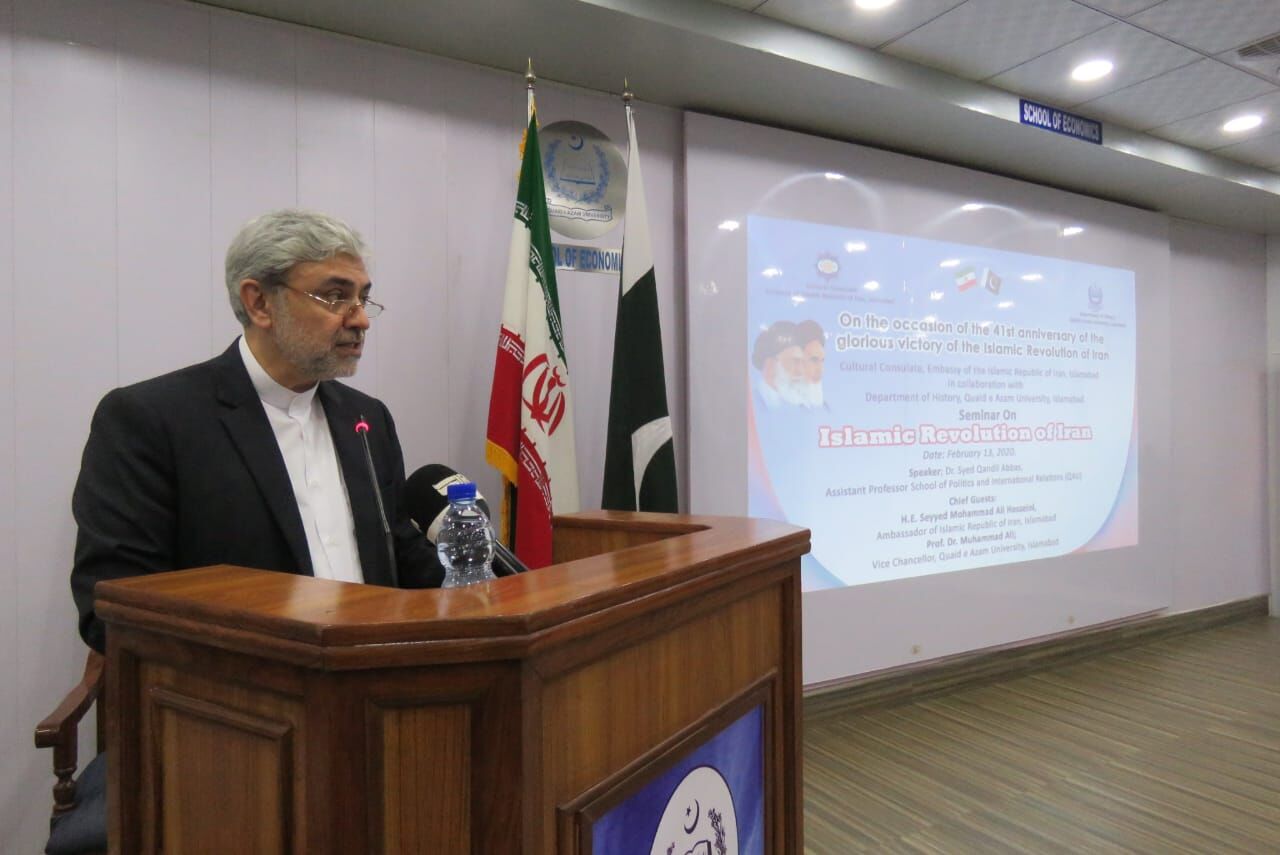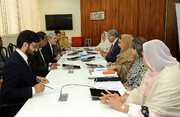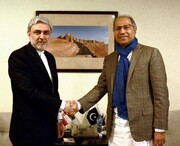They were speaking at a seminar on “Islamic Revolution of Iran” organized jointly by Cultural Consulate Embassy of Iran and Department of History Quaid-e-Azam University (QAU) here on Thursday.
In his first ever visit to any Pakistani university after assuming the charge of the ambassador of Iran Mohammad Ali Hosseini said that Islamic countries are far behind in the field of science and technology as compared to other countries of the world.
He said today it is expected from the faculty members and academic scholars of the universities of the Islamic countries in the first step to compensate the past weaknesses and backwardness.
“On this path full of hardships and pains, we have to launch Jehad literally to boost the scientific status and scientific advancement in our countries,” the diplomat noted.
Hosseini said if we do not progress scientifically, we will be permanently under threat of our civilizational, cultural and political enemies.

The ambassador went on to say that outcome of the 40 years of resilience of the Islamic Republic of Iran has been achievements of the superior technologies of the world, including nano-technology, medical, atomic, knowledge base industries, aerospace, etc.
“A part of direction towards scientific independence and subsequently scientific empowerment depends upon scientific collaboration among the universities and institutes of higher education in the framework of holding of symposium, signing of MoUs on technical and scientific cooperation, obtaining of information, exchange of faculty members and students, arrangements of study scholarships, translation, publication of articles and holding of seminars by the universities,” said Hosseini.
He said Iran embassy is ready to take steps to create necessary connections among the universities and scientific research institutions of the two countries.
“We can also arrange a stay for two weeks in Iran of the PhD students, whose thesis are related to Iran,” he said.

Vice Chancellor of Quaid-e-Azam University Dr Muhammad Ali said that people and the government of Iran have always stood by Pakistan in difficult times.
He thanked the stance of Iranian government and Supreme Leader Ayatollah Seyyed Ali Khamenei on Kashmir issue.
He viewed that potential of Iran-Pakistan ties has not been fully exploited. “It is the time where we must start collaborating in various sectors, especially in the field of higher education,” said the scholar.
“We would like to host scholars from Iran at the Quaid-e-Azam University which specializes in social, biological and medical sciences,” stated Dr. Muhammad Ali.
He noted that Iran is one the best countries in bio-technology, nano-technology and other scientific research areas.
“We look forward to collaborate with the Iranian embassy and would like to host Iranian scholars and students,” said the head of the QAU.
Iranian Cultural Consular Mohammad Reza Kaka, for his part, said Islamic Republic of Iran as an ideological and revolutionary political system is based on the foundation of the discourse of the Islamic Revolution.
“A survey of the Iranians’ public attitudes and behaviors clearly shows that the discourse of the Islamic Revolution has been deposited in the minds of the majority of the people,” said the envoy.
The diplomat on the occasion paid homage to Founder of the Islamic Revolution Imam Khomeini and martyred IRGC commander Lieutenant General Qasem Soleimani.
“The Islamic Revolution is a cultural revolution in Iran that has shown its cultural face to the world in comparison to other regimes and revolutions,” said Kaka.
He added that the most important goal in the ideals of the Islamic Revolution in Iran was the transformation of materialistic values into Islamic values.
Assistant Professor of School of Politics and International Relations QAU, Dr Sayed Qandil Abbas in his presentation gave detailed overview of the history of Iranian civilization and Islamic Revolution.
He said the Revolution threw away western backed dictatorship from Iran and established a strong Islamic democracy in the country.
He said that after the victory of the Islamic Revolution, Iran faced lots of challenges which could not damage the commitment of Iranian nation to the Islamic Revolution.
Expressing his views, Chairperson, History Department, QAU, Dr. Sayed Wiqar Ali Shah said that Islamic Revolution of Iran has changed the entire course of history. He added that the revolution proved that the politics and religion are interlinked.
“Founder of the Islamic Revolution Imam Khomeini changed the course of entire contemporary world,” he said.
He noted that Iran is the only power in region that is challenging the so-called supremacy of the US. “Iran enjoys a very special place in the hearts of the people of Pakistan,” said the professor.
On the occasion a short documentary about the achievements of Iran after 41 years of the glorious victory of the Islamic Revolution was also shown. A large number of students and faculty members of the Quaid-e-Azam University attended the event.
At the conclusion of the program prizes were given to the students who wrote best articles about the Islamic Revolution.

272**2050
Follow us on Twitter @IrnaEnglish





Your Comment